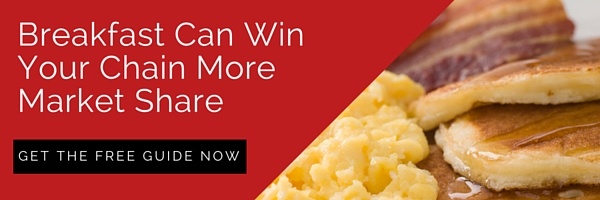
No matter how — or when — you eat breakfast, chances are it is no longer a sit-down meal prepared at home. At least, not all the time. Grab-and-go breakfasts are increasingly popular with busy Millennials headed to the office in the morning. However, they are also gaining favor as snack foods with young moms on the way home after running a carpool, with anyone who needs a comforting midday pick-me-up and with professionals who need a bit of protein on the way to a late afternoon appointment.
The QSR Breakfast Trend Is Huge, and It Is Diverse.
Even though breakfast may no longer be a morning tradition, it has become a primary focus for the industry. Breakfast is big business not only in the morning, but all day long and in all parts of the country, although preferences vary somewhat by region. Ignoring the trends translates to ignoring a huge opportunity.
According to those who track such consumer trends, the "snackification" of breakfast has led to what Euromonitor Senior Analyst Jared Koerten calls a "war on breakfast." An average two percent decline in sales of traditional breakfast cereals over the past five years is matched by an upsurge in sales of items like ready-to-eat breakfasts and "take along" biscuits. Portable breakfast foods are emerging as a whole new choice, and they are redefining the meaning of breakfast for both consumers and QSR leaders.
Breakfast Is No Longer the Way to Start the Day
Today, breakfast can be much more. One of the current “megatrends” surrounding breakfast is the blurring of "daypart boundaries," and it is being driven by Millennials who will account for 40 percent of restaurant purchases by the year 2020, according to the National Restaurant Association. This generation isn’t bound to “traditional meal times or foods,” but is more concerned with what they’re eating.
Millennials view food in a different light: Most are more concerned about value than the previously dominant generation of Baby Boomers. They also prefer whole foods over processed and are acutely aware of the genealogy and "upbringing" of their food. They embrace the notion that "you are what you eat" in a way that older generations only endorsed with lip service, and they eschew processed foods in favor of fresh and natural.
They also snack more, eat less, are open to new flavors and spices, like to experiment and tend to view food as portable and health-giving. They are also demanding, and can be "food snobs."
But, no doubt about it: Millennial attitudes and desires shape the culture of the industry. More than ever before, there is a sensibility to ethnic influences, exotic combinations, pairing of protein with natural and unexpected partners and "clockless" meals. Burgers for breakfast, egg-topped late-night snacks, chicken and waffles and yogurt as an accompaniment to a wide variety of other foodstuffs all cater to this new generation's somewhat erratic tastes.
Snacking Has Become Purposeful in Modern Life
The Hartman Group reports that today 80 percent of all snacking is "purposeful," and increasingly "supported by health and wellness cues." The QSR industry is keeping up with breakfast trends by supporting more fluid eating patterns. How? By lengthening breakfast serving hours, providing a larger and healthier variety of grab-and-take options, offering more fresh fruit and protein-rich choices and minimizing portions so that they are more compatible with snack culture rather than the "three squares" tradition.
The future of breakfast, in terms of menu development and customer base, although constantly evolving, must acknowledge and focus on health needs, nutritional benefits, value proposition and alternative eating styles.
A continuing shift in American eating habits signals more than one concept. On the one hand, convenience and nontraditional approaches may spell the demise of by-the-clock eating patterns and traditional meals. Just as important, however, is the move toward healthier and more satisfying food, whether it is prepared at home, served as part of a sit-down meal or offered to busy people who plan to consume it "on the go" at any time of day or night.
Breakfast for dinner? Snacks for Breakfast? The answer for consumers today seems to be, "Yes, absolutely!" QSR leaders that follow these new eating and breakfast trends are taking advantage of a market share that cannot be underestimated.






